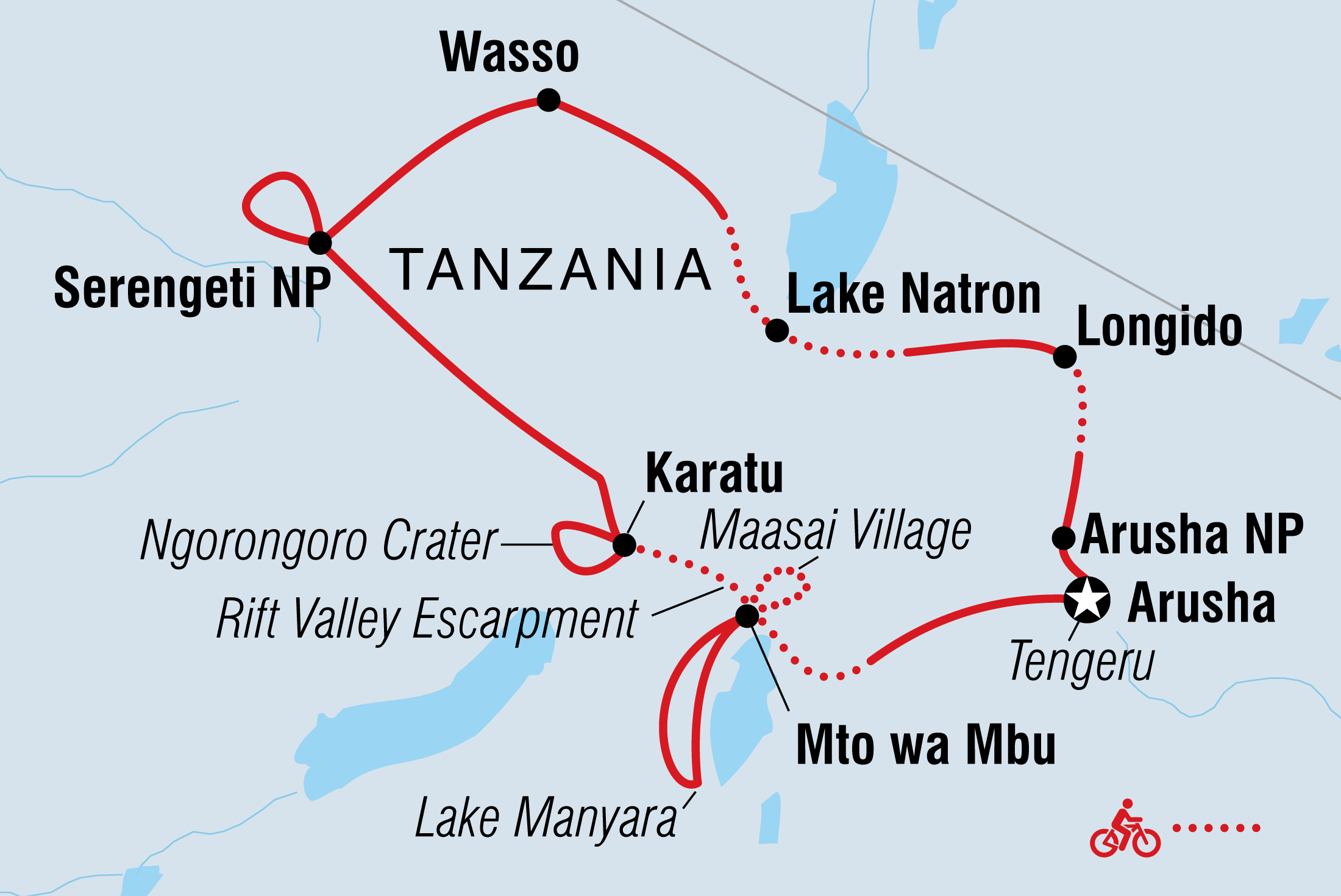
Brimming with mighty predators and birds, the Serengeti and Ngorongoro Crater are must-visits for any Tanzania trip, but safaris are only the beginning. This unique cycling adventure has you cruising down Great Rift Valley escarpments, strolling through farm villages, roasting and grinding your own coffee, drifting off to sleep among nocturnal creatures, experiencing the culture of the Maasai people, pedalling far off the beaten track to trails where no cars go, and of course sipping sundowners at sunset. With a support vehicle at every step of the journey, take your time to discover Tanzania on two wheels.
- Get the best view of Tanzania’s landscapes from two-wheels – cycle in the shadow of Mount Meru in Arusha and ride alongside wildebeest in Lake Manyara.
- Refuel for the ride with a cup of Tanzanian coffee. Roast, grind and taste your own in the village of Tengeru and get a closer look at local farm life.
- Cycle where tourists rarely go, across the remote, barely charted plains of Lengai in the realm of vast grasslands and misty volcanic peaks.
- The Serengeti National Park and Ngorongoro Crater are two of Africa’s very best wildlife arenas. Fall asleep to the sounds of the African night and take a safari in search of the rare black rhino.
- Stretch your legs on an optional hike to the volcanic peak of Ol Doinyo Lengai, a challenging trek that will reward you with superb sunrise views.
- By travelling on this trip, you’ll directly support our Intrepid Foundation partner, World Bicycle Relief. Donations provide school kids, health workers, and farmers in far-out areas with bicycles that provide access to education, healthcare, and income.
- Accommodation on this trip is mainly in two-person canvas dome tents with camping mattresses supplied.
- The type and variety of accommodation are determined by conditions on each of our routes. Each route is different - on some, we use a mixture of campsites and wild camps; on others, we also use hotels. In Africa, it's not usually practical to camp when staying in towns and cities, so we use hotel accommodations and eat out in local restaurants.
- There may be the occasional night stop when we stay on the grounds of a hotel or at a campsite, which may also have rooms/cabins available. In this case, there may be a choice of camping or upgrading to a room. Rooms cost approximately USD 40-100 per room per night for a twin room and cannot be pre-booked. Standards of these rooms vary greatly, and we recommend viewing the room before purchasing the night's accommodation. The day-by-day itinerary advises when upgrades may be possible (subject to availability).
- Keep in mind that if we are staying in dormitory accommodation, you may have to share with other passengers or be split into same-sex rooms.
- Campsites do have facilities, but they usually aren't to the same standard you would find in Western countries. For example, the bathroom facilities can be very basic. Toilet paper is rarely provided, and shower facilities can be as simple as a hose pipe spurting out cold water. Wild camps have no facilities at all.
- At times, there may be spare tents in the vehicles. Unfortunately, these cannot be used without the purchase of a single supplement. This is to ensure the tents avoid wear and tear or are clean and ready for the customers arriving on the next section of the trip.